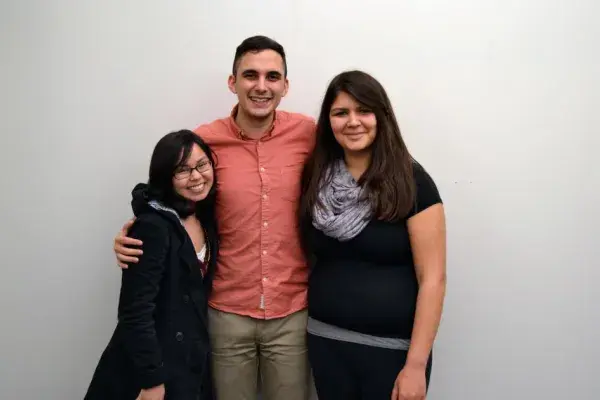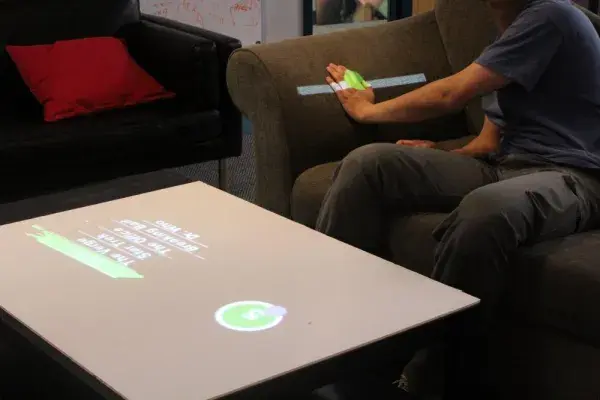In the Media
-

Rosé, Cassell Discuss Google, CMU Collaboration on WESA-FM
HCII Associate Professor Carolyn Rosé and Professor Justine Cassell recently appeared on WESA-FM, Pittsburgh’s NPR affiliate, to discuss C...
-

Hong's Startup Profiled in Post-Gazette
The Pittsburgh Post-Gazette recently profiled Wombat Security Technologies, a spin-off company founded by HCII Associate Professor Jason H...
-
The Link Features METALS Program
The first class of HCII METALS students are two-thirds of the way through the program.
-

Koedinger Profiled in SCS Magazine
Want to know more about what makes HCII Professor Ken Koedinger tick? What attracted him to Carnegie Mellon? What he does for fun? Check o...
-

Myers Mentioned in New York Times
HCII Professor Brad Myers appeared in the New York Times Magazine section’s “Who Made that Autocorrect?” on Friday, June 6.
-

CMU HCII Team Helps Feral Cats
A team of CMU HCII master’s students is working with local agencies to unite volunteers with the resources they need to rescue feral cats....
-

Cassell Discusses Quantified Self in Scientific American
The HCII’s Justine Cassell discusses the Quantified Self (QS) and how electronic devices that measure and interpret our physical and menta...
-

NYT Highlights Myers’ Role in Popularizing Progress Bars
A recent Innovation column in the New York Times’ “Magazine” section posed the question “Who made that progress bar?” Part of the answer i...
-

Harrison Profiled in Pittsburgh Magazine
The March 2014 issue of Pittsburgh Magazine featured a Q&A with HCII Assistant Professor Chris Harrison. In the article, Harrison disc...
-

Apple's Mac Still Influences, 30 Years After Debut
The HCII's Brad Myers (bottom, right) and Jim Morris (top, right) were featured in a recent Associated Press article assessing the impact ...
-

MHCI Alumni Develop the Trance App, The Social Dancefloor
MHCI alumni Julien Altieri, Harper LaFave, Marwa Muhammad and Youna Yang designed and created the Trance App as a way for “letting dancer...
-
PhD Student Will Odom’s Work on Digital Legacy Highlighted in ScienceNews
PhD student Will Odom’s work on digital legacy, and in particular digital legacy as it relates to bereavement in this technological age, i...
-

Kinect plus projector makes anything a remote control
New Scientist featured WorldKit, a combination of depth cameras and projectors that enables computer interfaces to be created on almost an...
-
“Self-Censorship on Facebook” Featured in The Atlantic, Mashable and Huffington Post
Sauvik Das’s internship work, “Self-Censorship on Facebook” has been gaining publicity.
-
Analyzing Smartphone App Privacy
Many smartphone apps collect a great deal of personal information about individuals.
-
Qeexo aims to make smartphone touchscreens even smarter
The Pittsburgh Business Times reported on Qeexo, a Carnegie Mellon spin-out co-founded by Human-Computer Interaction Institute graduate st...
-

PayTango Featured in The Chronicle of Higher Education’s Wired Campus Blog
The Chronicle of Higher Education’s Wired Campus blog recently featured PayTango, the fingerprint-payment system created by four Carnegie ...
-
Close Facebook Friends Are Effective in Finding New Jobs
Many users regard Facebook as a place to waste time and socialize with people to whom they have tenuous connections. But a new study sugge...
-
Human-Robot Interaction Research Featured in IEEE Spectrum
Researchers at the HCII have been studying how the manner in which robots communicate affects human attitudes.
-

NewScientist Interviews Kittur About Crowdsourcing
Writing in NewScientist, Hal Hodson suggests that crowdsourcing’s Wild West days of exploitation may soon be over. He reports on efforts t...

